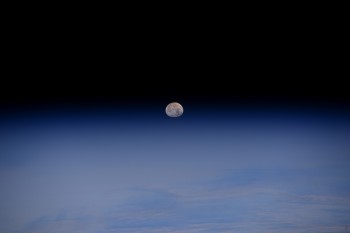Wir Erdbewohner sind Entdecker, wir leben auf einer kleinen blauen Insel im Universum. Und so wie ein Inselvolk den Ozean um sich herum verstehen muss um zu überleben, müssen wir Erdbewohner den Weltraum um uns herum verstehen. Es ist unsere Verantwortung gegenüber unseren Nachfahren, den Weltraum um uns herum zu erforschen.
Der Mond ist unser nächster Begleiter, er ist vermutlich aus der Erde heraus entstanden, und ist deshalb ein wichtiges Archiv unserer eigenen Vergangenheit. Doch er ist mehr als das – so, wie wir Menschen auf der Internationalen Raumstation ISS lernen, lange Zeit im All zu verbringen, so werden wir vom Mond lernen, wie wir auf anderen Planeten überleben und forschen können. Er ist unser Sprungbrett zu einem weiteren interessanten Nachbarn, dem Mars. Ohne dieses Sprungbrett, das nur ein paar Reisetage entfernt ist, wird der Flug zum Jahre entfernten Mars unrealistisch schwierig.
Wer weiß, vielleicht entdecken wir von einem Teleskop auf der Rückseite des Mondes ja auch den nächsten Asteroiden mit Kollisionskurs auf die Erde.
Eine langfristige internationale Forschungsmission zum Mond, nicht nur eine kurze Landung an einer Handvoll verschiedener Orte, wäre nicht nur der nächste große Schritt für die Menschheit, sondern auch die größte Entdeckungsmission auf die wir Menschen uns seit langer Zeit begeben würden.
Bei solch einer Mission geht es nicht mehr um die Nationalität der Astronautinnen und Astronauten. Es geht darum, dass wir alle zusammen den Entschluss fassen und den Mut haben, einige von uns dorthin zu schicken. Dennoch gilt es dabei natürlich für alle Hochtechnologienationen, und deshalb besonders auch für Deutschland und Europa, mit dabei zu sein um nicht international den Anschluss zu verpassen. Ein solch wichtiges gemeinsames Ziel wird sehr stabilisierend auf die internationale Gemeinschaft wirken, wie es die Internationale Raumstation ISS bereits jetzt tut.
„No Dot“ statt „Blue Dot“.
Ich habe an mir selbst festgestellt, nach ein paar Tagen außerhalb unseres Planeten sind wir nicht mehr Deutsche, Europäer, Russen, Chinesen oder Amerikaner, sondern wir sind schlicht und einfach Erdbewohner. Selbstverständlich würde es mich als ESA-Astronaut und Geophysiker besonders faszinieren, am Rande eines Mondkraters zu stehen und diesen zu erforschen. Denn mit jedem Geheimnis, das uns der Mond verrät, erfahren wir auch mehr über unsere Erde, die von der Vorderseite des Mondes eine kleine blaue Murmel am Firmament ist und von der Rückseite des Mondes aus gar nicht mehr zu sehen ist. Ich bin mir sicher dass die Perspektive, unsere Heimat aus den Augen zu verlieren, für uns Menschen sehr heilsam sein wird.





Discussion: 6 comments
Hi Alex,
Our Blue Dot
This mission in particular grabbed my immediate attention and I fell in love with the whole concept.
I was hooked from my first introduction, watching you all at work on a live TV programme. For most your mission I was addicted, throughout it all I regained some hope for our planets future, thank you for sharing and caring.
Its incredible to think you want to do it all over in the future.
Anna
I had a disturbing thought the other day: what if we don’t go back?
It was jarring. Probably because I’ve been studying a lot of recent history lately – 19th century stuff. And I realize at some point, history transitions from being OUR past to being our ancestors‘ past. At almost 50, World War II was way before I was born, but iit is still part of MY past. World War I is on the edige of my past. Charles Babbage’s analytical engine is just some crazy Victorian fantasy.
If we don’t go back, this is the fate of our moon journey. I saw it so it will be real to me. And it will be real to my son, to the next generation. But after that? The deniers will grow stronger, sure. But even the believers, what will they think? It will just be a footnote. A wacky stunt of our ancestors. Another pointless and useless invention. Maybe it will become the epitome of useless accomplishments.
We have to go back so that it remains our greatest success, rather than becoming our greatest failure.
So does this mean you’re going to the Moon?
I would love to go to the moon and see about doing something about that blind spot I think with the help of some great technology and maybe fine tuned we can do it! Thank you very much respectfully Brent Dixon
Hi Alex,
though your Blue Dot Mission is a while ago now, I find myself sitting on my roof terrace and enjoying the ISS flyovers more often these days. I caught up on a couple of your Interviews. Can speak only for myself, but your passion and your vision and „view of our planet“ and the message you want to share totally grabbed me. Preserving our planet is important! Exploring is humans nature – I can’t wait to see you up in space again!
All the best!
Lukas
You’re a great man !keep up the good work .I’m here always give you cheering all the time!